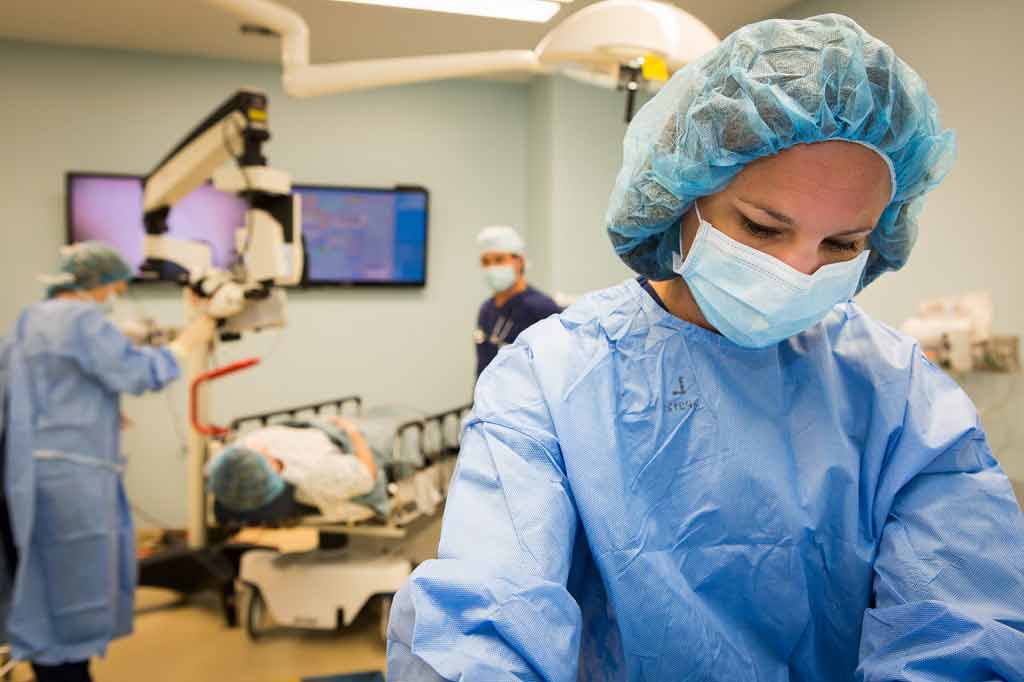Vaginal mesh surgery should be a last resort, says NICE
Medical practice

Vaginal mesh surgery should only be used as a "last resort" to treat pelvic organ prolapse and urinary incontinence, it was widely reported today.
Vaginal mesh surgery should only be used as a "last resort" to treat pelvic organ prolapse and urinary incontinence, it was widely reported today.
The advice is included in new draft guidance from the National Institute for Health and Care Excellence (NICE), with formal guidance expected in April 2019.
This new recommendation will be welcome news to many. Mesh surgery has seen thousands of women complain of devastating side effects, including pain, bleeding, bowel problems and difficulties with sexual intercourse.
The NICE guidelines recommend a range of non-surgical options are considered first, such as lifestyle changes and pelvic floor training.
Surgical options, including the use of mesh, are advised only if these measures fail.
If mesh surgery is considered, NICE advises that patients should be made aware of the risks of the procedure. They should also receive extensive follow-up care for any mesh-related complications.
Read more about the treatment options for prolapse and urinary incontinence.
Where does the guidance come from?
The guidelines have been published by NICE, an independent organisation that produces best practice guidelines for health and social care professionals. Guidelines are based on the best available evidence on the topic.
The current guideline relates to the management of urinary incontinence and pelvic organ prolapse (affecting the womb, bowel, bladder or vagina) in women. It'll replace the previous guidance on this topic published in 2013.
It's currently been published as a draft for consultation. This means it's open for comment from organisations or individuals.
The consultation period ends in November, after which the final publication will be made.
Recommendations in the draft guideline could change slightly, but are likely to remain broadly the same in the final document.
What does NICE recommend?
The NICE guideline covers in detail how urinary incontinence and organ prolapse should be assessed and managed.
It covers non-surgical options, surgical options if these fail (including mesh surgery), and follow-up data that should be collected if mesh surgery is performed.
Incontinence
The main new recommendation is to discuss with women the benefits of non-surgical treatments before considering surgery.
Non-surgical options may include:
- drinking less water, coffee and other fluids
- pelvic floor training
- bladder training programmes
- medicines to treat an overactive bladder
- more invasive procedures for overactive bladder if the above steps fail, including use of nerve stimulation or botulinum injections
If these steps don't control symptoms, surgery may be the next step, with a mesh sling being one of the surgical options.
But women should be made aware that surgery has a risk of complications.
Pelvic organ prolapse
In managing prolapse, NICE recommends doctors have a full discussion with women about all the treatment options, taking into account things like age, preferences, wish for further children, lifestyle and other illnesses.
Non-surgical options may include:
- lifestyle changes like losing weight, preventing constipation and avoiding heavy lifting
- pelvic floor training
- oestrogen pessaries or creams for women with menopausal symptoms
If women decline or don't respond to these treatments, surgery may be considered, with mesh being an option.
Again, NICE highlights the need for women to be made aware of the risks of complications from surgery.
What does NICE say if mesh is used?
If mesh is chosen, NICE says that the woman's details, the procedure performed, and the type of mesh and stitches used should be recorded.
NICE advises that women are followed up for at least 5 years, recording:
- the extent of the prolapse or incontinence
- whether symptoms have got better or worse
- suspected or confirmed mesh-related complications
- any treatments used to treat complications
Potential mesh-related complications include:
- pain or changes in sensation in the back, abdomen or pelvic region
- vaginal bleeding or discharge
- painful sexual intercourse (for men or women)
- urinary problems like painful urination, incontinence or infection
- bowel problems like incontinence, pain, or passing blood or mucus
- symptoms of infection, alone or with any of the above symptoms
It's recommended that women with complications are referred to a specialist for further assessment and management.
What response has there been?
There has been a varied response to the new guidelines from both professionals and patient groups.
Dr Duncan McPherson, clinical director at the MHRA (which governs the safety of medical drugs and procedures), supports the recommendation to continue to use mesh as an option with ongoing follow-up of effects.
He says: "The safety of patients is our highest priority and while we recognise some women do develop serious complications, we also know many women gain benefit from these surgical procedures…
"We echo NICE's view that the decision to use mesh surgery for urinary incontinence and pelvic organ prolapse should be made between the patient and clinician, after discussing all the options and recognising the benefits and risks in the context of the distressing conditions being treated."
The media reported the reactions of others who feel the recommendations aren't strong enough.
The Telegraph quotes Kath Sansom of the campaign group Sling the Mesh, who says: "These draft guidelines are to be welcomed but do not go far enough. Our ideal scenario is to see pelvic mesh stopped. Full stop."
Sir Andrew Dillon, chief executive of NICE, stresses that women should be able to make decisions that are right for them, with full understanding of the risks and benefits of the procedure.
He says there is "almost always another intervention recommended in our guideline, which does not involve surgical mesh".
Sir Dillon suggests that if women are being treated by a doctor who's unable to provide a full range of treatment choices, they should be referred to another who can.






 Subscribe
Subscribe Ask the doctor
Ask the doctor Rate this article
Rate this article Find products
Find products







